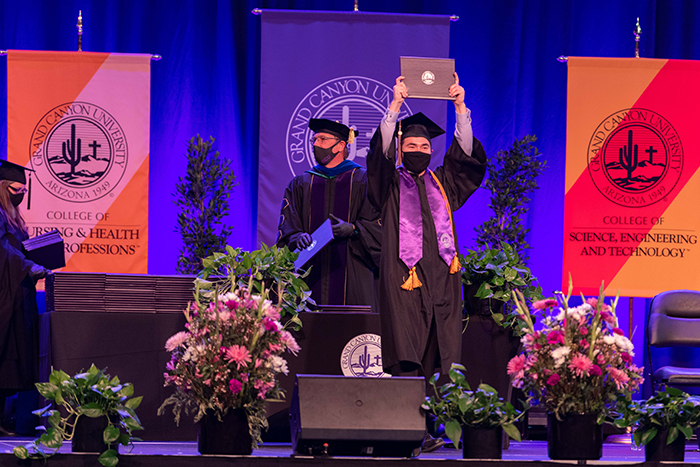It was going to take more than a year-long global pandemic to stop approximately 28,000 students at Grand Canyon University from completing their degrees during the 2020-21 academic year – the largest graduating class in GCU’s history.
Those students will be honored during commencement ceremonies on April 19-20 for traditional-aged students and May 15 for working adult students studying online.
READ ALSO: GCU freezes tuition for 13th year
“It’s a testament to those students’ resilience and determination to complete their degree during challenging circumstances. They should be very proud of their accomplishments,” said GCU President Brian Mueller. “It’s also a reflection of how easily GCU was able to adapt its curriculum during the pandemic and ensure that our students were able to continue their academic journey, whether in-person on our Phoenix campus, through our online campus, or a hybrid of both. Our investments in technology and a state-of-the-art learning management system made the transition seamless for our students.”
The graduating class includes those who completed their degrees in Summer 2020, Fall 2020 and projected graduates from Spring 2021.
The commencement ceremony for traditional students April 19-20 will be in-person at GCU Arena. Each graduate is allowed two family members or friends to attend the event. Guests will be seated with social distancing throughout the Arena.
Among the GCU graduates is Oscar Frayer, a four-year starter on the men’s basketball team who completed his degree in February. Frayer lost his life in an auto accident on March 23, three days after GCU appeared in its first NCAA Tournament. Frayer’s mother, Bionca Sparrow, and other family members will be on hand to accept his diploma on April 19.
The May 15 commencement ceremony will be virtual for online students who are scattered throughout the world, with an opportunity to participate in an in-person ceremony tentatively scheduled for September at GCU Arena.
The 2020-21 academic year at GCU was filled with many other notable achievements:
• The GCU community contributed greatly to the COVID-19 relief efforts in Arizona – first through the production of personal protective equipment that was shared in the community, then through COVID testing opportunities for the neighborhood, and finally through the operation of a vaccination site that was operated by GCU volunteers and administered more than 100,000 vaccines to the public. The volunteer vaccination effort saved taxpayers millions of dollars.
• Enrollment on the Phoenix campus reached 23,000 students, with another nearly 90,000 students studying online.
• A series of unifying events through GCU’s Multicultural, Diversity and Inclusion Office helped foster unity on campus during a year in which important diversity issues were raised throughout the nation.
• GCU’s Honors College, which opened in 2013, will surpass 1,000 graduates this spring.
• The University launched a partnership with CityServe International to help bring food and, in the future, much-needed household goods and supplies to needy families through the creation of a distribution hub on campus.
• GCU continued its efforts to make higher education accessible and affordable by announcing that it would freeze tuition on its ground campus for the 13th consecutive year.
• GCU’s on-campus housing, rated sixth-best among 1,376 colleges in the country by niche.com, started construction on three more six-story, apartment-style residence halls that will be known as The Rivers and will open in the fall of 2021. The University is expecting its largest incoming class ever in 2021-22.
• GCU’s new Canyon Ventures innovation and business acceleration center attracted 29 companies in its first year, leading to 75 jobs for students.
• Despite many challenges related to COVID-19, graduates in the nursing program passed their professional licensure exam at a 96.17% first-time pass rate in 2020.
• Academic programs in engineering and computer science received ABET accreditation in their first year of eligibility.
• The university continued its heavy investments into the surrounding inner-city neighborhood, including a $2.2 million 11-year partnership with the Phoenix Police Department to improve neighborhood safety; the largest Habitat for Humanity partnership in the country in which $3.8 million has been raised and 26,000 volunteer hours contributed to renovations at 326 homes in the community; and a groundbreaking K-12 partnership that provides free tutoring and mentoring to students at neighboring schools as well as more than 300 full-tuition scholarships to low-income students who sought that academic assistance and are now paying it forward as college students by mentoring the next generation of K-12 students behind them. These projects have paid off in the form of significant declines in crime, increases in home values and a K-12 system that has the full weight of a university supporting it.




